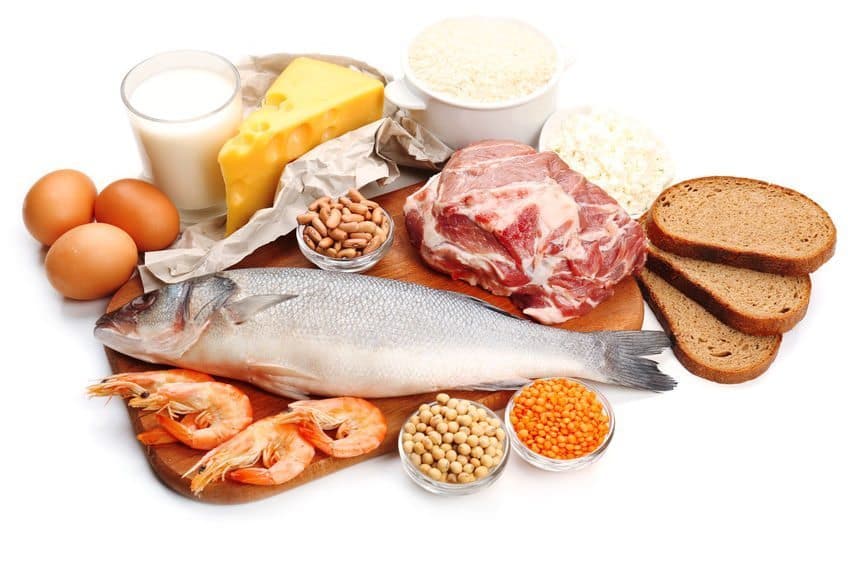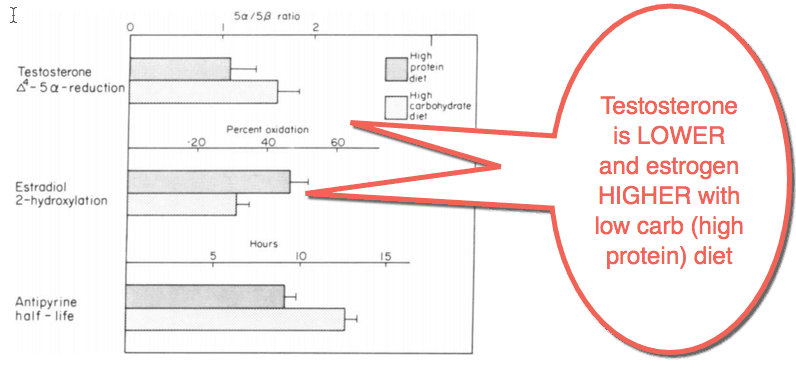
We’ve been discussing some pretty shocking things here.
For one thing, we’ve demolished the myth that men’s testosterone levels fall as they age.
Now, we’re going to talk about what diets best regarding increasing testosterone and lowering estrogen.
 I’ve made a point of telling you several times is that cortisol levels and testosterone levels in the body are generally inversely related.
I’ve made a point of telling you several times is that cortisol levels and testosterone levels in the body are generally inversely related.
So high cortisol means low testosterone, and high testosterone means low cortisol.
Since cortisol is our so-called “stress” hormone, we don’t want high levels.
It does some nasty stuff.
And we want higher testosterone for some fairly obvious reasons.
The researchers wanted to know how these hormones are affected by the carbs and proteins that we eat.
Can a diet high in one or the other keep our cortisol down and support higher testosterone?
In this study, researchers looked at seven men.
They fed them various diets and then evaluated their hormone levels.
The men were on a high protein diet and then switched to a high carbohydrate with low protein diet.
They found very clearly that a high carbohydrate diet leads to higher testosterone and lower estrogen.
Testosterone concentrations in seven normal men were
consistently higher after ten days on a high carbohydrate diet.
But as you would now expect:
By contrast, cortisol concentrations were consistently lower during the high carbohydrate diet.
And they found that estrogen levels RISE with a high protein diet.
The researchers found that raising protein and LOWERING carbohydrates increased cortisol levels and lowered testosterone.
And the high protein lower carb diet increased estrogen:

The high protein diet was rich in
meat, fish, poultry, egg white, and a liquid dietary supplement (Sustacal, Mead Johnson and Company, Evansville, IN); in this diet
44% of total calories protein, 35% carbohydrate
21% fat.
The second diet contained
carbohydrate-rich foods such as bread, vegetables,
fruit, juices, pastry, and candy~ in this diet
10% of total calories were protein,
70% carbohydrate, and
20% fat.
The major difference between the two diets was that the high-protein diet had lower carbohydrates.
And to make up for the lower amount of calories they increased the protein.
So we’re comparing a high-protein diet with low carbohydrates, to a high carbohydrate moderate protein diet.
And the winner is — high carb diets increase testosterone and lower estrogen.
I know a lot of people will say, but Matt, don’t you say that we should eat high-protein?
I do say you should eat high-protein.
But it’s not high-protein the way these guys did high-protein.
It’s high-protein AND high carbohydrates.
And it means cutting back the fat.
The guys in the study did not cut back the fat.
They simply cut back the carbs and increased the protein.
It was a good study for a protein versus carbohydrates…
And the answer is clear, that high carb, means high testosterone and lower estrogen.
————-

- Diet-hormone interactions: Protein/carbohydrate ratio alters reciprocally the plasma levels of testosterone and cortisol and their respective binding globulins in manhttp://www.sciencedirect.com/science/article/pii/0024320587900865
- Nutrition-endocrine interactions: Induction of reciprocal changes in the A4-5a-reduction of testosterone and the cytochrome P-450-dependent oxidation of estradiol by dietary macronutrients in manhttp://www.pnas.org/content/80/24/7646.full.pdf
- Effect of a High-Protein Diet versus Standard-Protein Diet on ... - NCBI
https://www.ncbi.nlm.nih.gov/pmc/articles/PMC5644969/ - Protein
https://www.hsph.harvard.edu/nutritionsource/what-should-you-eat/protein/
